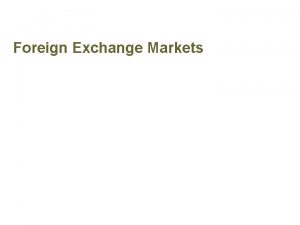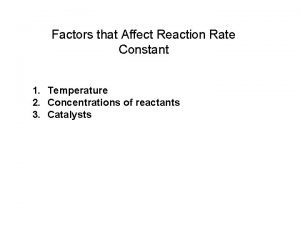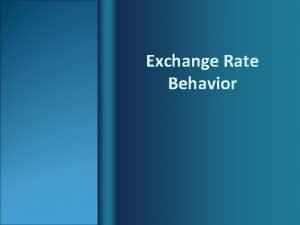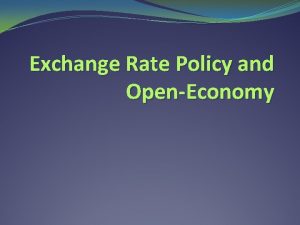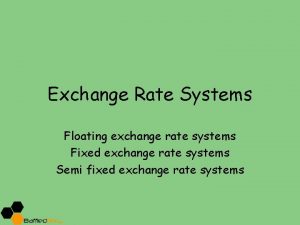Factors that Affect the Exchange Rate 5 Factors








- Slides: 8

Factors that Affect the Exchange Rate 5 Factors

Floating Rate • Canada has a floating rate, which means there is no fixed rate of our currency with respect to other currencies. Supply and demand dictate the price. Therefore, if more people want to buy the currency, its price will increase. If less people find it desirable its price will decrease.

Demand AND Supply • Currency revaluation – When demand is greater than supply and the value increases. • Currency devaluation – When supply is greater than demand the value decreases.

Factor #1 – Economic Conditions • The inflation rate, unemployment rate, GDP (gross domestic product) and interest rates all have an impact on the price of the Canadian dollar. (will explain these as we go! OR Take Economics 12!) This is the same for most currencies from democratic counties. If the economy is going well then more people desire the currency therefore causing it to increase in value.

Factor #2 – Trade Between Countries • The greater a country’s exports in comparison to imports the greater demand for its currency, but this also depends on WHAT is being exported. This relationship is called “terms of trade”

Factor #3 - Politics • The more stable a country the more people trust it the more demand for its currency. Do you trust this man’s currency? Why or why not?

Factor #4 – Psychological Factors History: If countries are historically stable, then people will trust their currencies. Hard Currencies – Currencies that are easily changed because people trust them and even seek ‘refuge’ in them when economic downturns happen. Soft Currencies – Currencies not as easy to convert on the open market and are not. Examples: Chinese Yuan and Russian Ruble.

#5 - Speculation • Involves buying, holding, or selling foreign currency in anticipation of its value changing. As price changes people make or lose money. How can speculation change the value of a particular currency?
 Determination of exchange rate
Determination of exchange rate What are the factors that affect the rate of dissolution
What are the factors that affect the rate of dissolution What factors affect rate of diffusion
What factors affect rate of diffusion What factors affect the rate of corrosion
What factors affect the rate of corrosion Factors that affect the rate of reactions
Factors that affect the rate of reactions Factors that affect the rate constant
Factors that affect the rate constant Ngoại tâm thu thất chùm đôi
Ngoại tâm thu thất chùm đôi Block av độ 2
Block av độ 2 Thể thơ truyền thống
Thể thơ truyền thống
